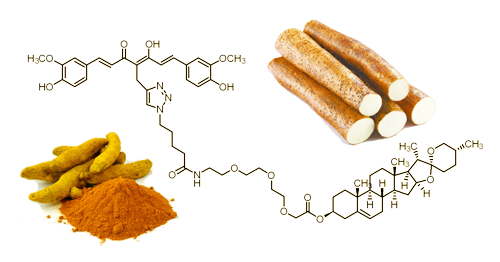Bivalent Ligands for Alzheimer's disease

Numerous pathological factors, including amyloid-beta, oxidative stress, dyshomeostasis of biometals, and neuroinflammation, have been implicated in the development of Alzheimer's disease. Furthermore, cell membrane lipid rafts have also been shown to play a critical role in the processing and oligomerization of amyloid-beta, and the production of ROS, both of which are major contributors to the pathogenesis of Alzheimer's disease. The relationship of lipid rafts with these and other risk factors may be able to be exploited therapeutically. In following this line of reasoning, we have developed several series of bivalent ligands that utilize lipid raft anchors and a multifunctional oligomerization inhibitor, in this case curcumin, to investigate their potential neuroprotective abilities in Alzheimer's disease. Curcumin, a natural product found in the turmeric spice, has demonstrated a range of beneficial effects in a variety of diseases, including antioxidative and anti-inflammatory function, biometal binding capability, and amyloid-beta oligomerization reduction. Our novel bivalent ligands have displayed many of these properties in both cellular and animal models of Alzheimer's disease. Investigations into the structure-activity relationships of the lipid raft anchor and linker composition are one the projects currently ongoing in our lab. Furthermore, we're also exploring the mechanism of action of these novel ligands.